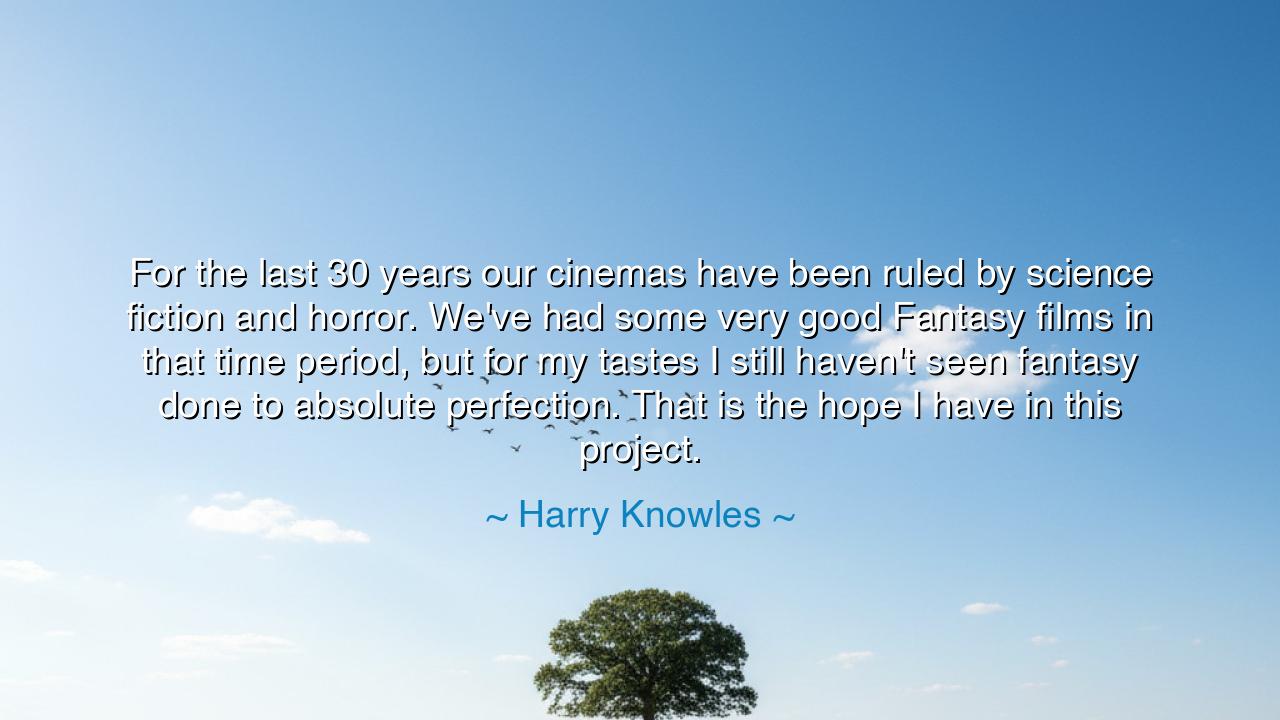
For the last 30 years our cinemas have been ruled by science
For the last 30 years our cinemas have been ruled by science fiction and horror. We've had some very good Fantasy films in that time period, but for my tastes I still haven't seen fantasy done to absolute perfection. That is the hope I have in this project.






In the realms of storytelling, where myth and legend meet the modern canvas, there exists a profound truth about humanity’s need for the fantastical. Harry Knowles, a modern voice in the world of cinema, captures this truth when he reflects: "For the last 30 years our cinemas have been ruled by science fiction and horror. We've had some very good fantasy films in that time period, but for my tastes, I still haven't seen fantasy done to absolute perfection. That is the hope I have in this project." These words, spoken with both longing and ambition, speak to the timeless human desire to reach beyond the limits of the real world and explore realms of wonder, mystery, and possibility. Fantasy and science fiction, as Knowles notes, have shaped the cinematic landscape for decades, but the pursuit of a perfect fantasy—one that captures the true spirit of the ancient myths—remains an elusive dream.
In the ancient world, the art of storytelling was revered above all else. The epic poems of the Greeks and Romans, such as Homer’s Iliad and Odyssey, carried the seeds of fantasy, with gods and heroes crossing the boundaries of reality. The myths of gods like Zeus, Poseidon, and Hera were not mere tales, but deep explorations of the human spirit, desire, and fear. Science fiction and horror, like the stories of ancient monsters or the tales of the gods’ wrath, share this same tradition: they deal with the unknown, the supernatural, and the forces that shape our world in ways we can’t fully comprehend. In this sense, Knowles’ reflection on modern cinema is deeply connected to the ancient impulse to tell stories that challenge the limits of human experience, pushing us beyond the known and into the mystical and divine.
For thousands of years, fantasy was the lens through which ancient cultures understood the world. The Sumerians wrote of the gods’ involvement in every aspect of life, from creation to destruction. The Epic of Gilgamesh, one of the oldest known stories, intertwines fantasy with the search for immortality. Gilgamesh himself, a king of mortal flesh, embarks on a journey to the ends of the earth, battling gods, monsters, and his own fate. This ancient tale reflects Knowles’ desire to see fantasy done in its truest form—stories that speak not just of magic and monsters, but of the human condition and our struggle to understand the forces that drive us.
However, as Knowles rightly observes, while cinema has offered us numerous science fiction and horror films, true fantasy—the kind that speaks to the heart and spirit of myth—remains something that has yet to reach perfection. The films of recent decades have captured the imagination with incredible visions of space travel, alien life, and apocalyptic worlds, but they often miss the deeper, more profound truths that fantasy brings. Think of the modern Lord of the Rings trilogy, a cinematic interpretation of J.R.R. Tolkien’s work, where grand battles and mythical creatures abound, but at its core, the journey is not simply of conquest; it is of friendship, sacrifice, and the struggle between good and evil. Tolkien’s world, inspired by ancient legends and cultures, presents a kind of fantasy that connects deeply with the human soul, a reflection of Knowles’ yearning to see fantasy done with absolute perfection—not just in the realms of action, but in the reflection of humanity’s most enduring values.
Consider the ancient heroes—like Beowulf, who battled the forces of darkness in the form of Grendel, or King Arthur, whose legendary sword Excalibur served as a symbol of divine right and justice. These stories, passed down through the ages, speak to something universal in the human spirit: the desire to face the impossible, to challenge fate, and to understand our role in the larger cosmic drama. Knowles and other modern creators seek to capture this ancient spirit in the fantasy genre, knowing that true fantasy is not about the world’s visual splendor alone, but about the ideas and values woven into the narrative. It is about creating worlds where the moral dilemmas, the human struggles, and the divine interactions are as real as the worlds they depict.
The lesson in Knowles’ reflection is one of persistence and vision. The journey toward perfect fantasy—toward a world that seamlessly blends the fantastical with the human condition—requires not only the creativity to build otherworldly realms but the wisdom to understand that these realms must reflect the depth of human experience. As the ancients did with their myths and as Tolkien did with his Middle-Earth, modern storytellers must seek to connect the supernatural to the universal truths that bind us all. It is not enough to create a world of magic and monsters; the true power of fantasy lies in its ability to teach us something profound about ourselves, our values, and our place in the universe.
As we move forward, let us take up the mantle of the storytellers who have come before us. Like Knowles, we must pursue the creation of fantasy not only as an entertainment but as a tool for reflection, exploration, and understanding. Let us weave together the threads of our collective imagination and history, drawing inspiration from the ancients and from the modern world, to create stories that transcend the limits of their own time. Whether in film, literature, or other mediums, let us strive to create fantasy that speaks to the very soul of humanity, and in doing so, bring to life the true magic of the human spirit.






AAdministratorAdministrator
Welcome, honored guests. Please leave a comment, we will respond soon